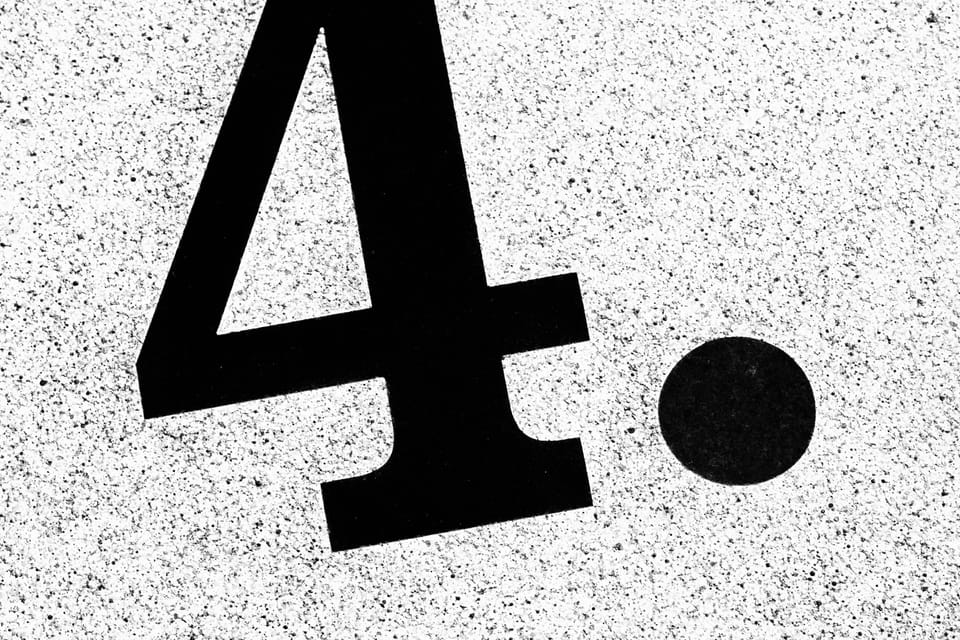
Shameless Self-Promotion
Back in April, The________Experiment premiered composer Owen Bloomfield’s setting of “Do Not Wish For Any Other Life,” a sequence that makes up the second section of my recent book of poems, T’shuvah. I finally posted the video to YouTube. I’ve put the text of the poem in the notes that accompany the video so you can follow along if you like.
Four Things To Read
One Book
A Common Violence, by Pat Falk: Pat was my colleague for more than thirty years before she died during the pandemic, if I understood correctly, of post-surgery covid complications. I knew her as a teacher passionate about helping students come to the awareness of themselves that writing can bring, as a deeply committed poet, and as an unapologetic feminist. In this book, her last, she brings all those parts of herself to bear on the question of the violence—political, interpersonal, and within our own bodies—that is an inescapable part of the world we live in. The poems are spare and allusive, locating meaning in descriptions of the physical world that take on the significance of symbol and metaphor; and the truths they arrive at are correspondingly unadorned and beautiful in the simplicity with which they hold both what is dark and difficult and frightening, and what is filled with light and hope. I bought the book soon after it was published in 2019, but such is the way of the to-be-read-pile that I did not read it in time for me to tell her how much I admire it. It’s a book I recommend to you without hesitation.
Three Articles
“The Resistance Will Continue,” Hamas Pledges Amid Gaza Ceasefire Talks, by Jeremy Scahill: “Hamas and Israel appear closer to some form of a Gaza ceasefire deal than at any time since the brief truce last November,” Scahill writes, but then goes on to draw out in detail just how politically complex, fraught, and intractable the situation is and is likely to continue to be over the long term. This article, thought-provoking and in many ways disheartening, is well worth reading.
After Learning Her TA Would Be Paid More Than She Was, This Lecturer Quit, by Adrienne Lu: “Reiterman, who holds a Ph.D. and has taught as a part-time lecturer at the university since 2020, recommended a former student of hers who had just graduated with a bachelor’s degree and would be pursuing a master’s in education. But when administrators started the hiring process and copied Reiterman on the emails, she was shocked to learn that the teaching assistant would earn $3,236 per month — about $300 over Reiterman’s own monthly pay.” The situation discussed in this article illustrates perfectly both the value of union organizing in higher education and what is wrong with the adjunctification of higher ed.
What I’m Doing About Alice Munro, by Brandon: “As I read Skinner’s essay, I confess, I did not think of the short stories. I did not think of Alice Munro, the great writer. I did not think of Alice Munro the brilliant spinner of stories that had seen me through periods of alienation and isolation. I did not think of the work or the art, or even what are we going to do with the work now that we know this? My first and only thought was Andrea Skinner’s words, which I believed in their totality.” Andrea Skinner is the daughter of the late Alice Munro, a Nobel Laureate whose name I know, of course, but whose work I will confess that I do not. Skinner revealed, in an essay she published in the Toronto Star, not only that her stepfather sexually abused her when she was a child, but that Munro chose to stay with the man even after her daughter disclosed what he did. Adding insult to injury, he did not deny the accusations. Instead, in a letter to the family, he accused Skinner, who was nine-years-old at the time of the abuse, of having seduced him. Skinner used that letter to get her stepfather convicted. Even after that Munro chose to stay with him. (Unfortunately, Skinner’s piece is behind a paywall.) What I find compelling about Brandon’s response to this story is the emotional and intellectual clarity he brings to explaining why he finds the question that so many people are now asking about how to deal with Munro’s art both uninteresting and, ultimately, irrelevant.
Thanks for reading It All Connects...! Subscribe for free to receive new posts and support my work.
Four Things To See
These images are all from a collection that the British Library uploaded to Flickr. All images in the collection are in the public domain.
Rudaba and Zal
This is an illustration from a 17th century manuscript of the Shahnameh originally produced in Isfahan, Iran. It shows Rudaba, on the roof of her palace with two maids, letting one of her ringlets down to Zal, who presses it to his cheek. Zal and Rudaba are the parents of Rostam, probably the best known hero of the Shahnameh.
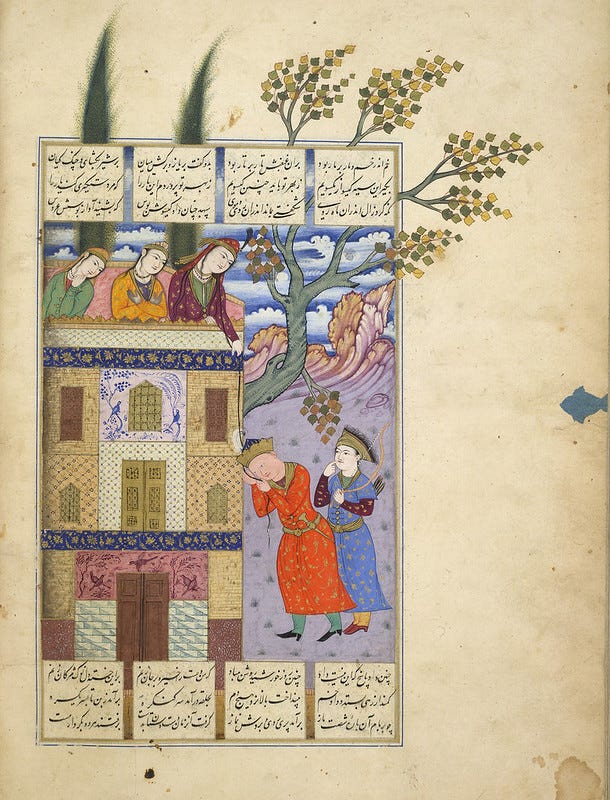
Illustration of the constellation Pisces
By Marcus Tullius Cicero, circa 820-840
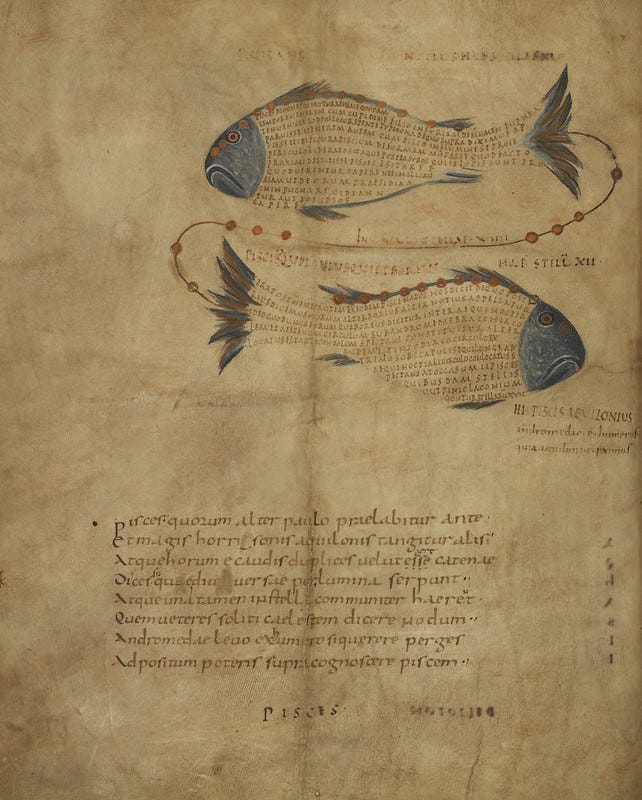
from Flore de virtu e de costumi (Flowers of Virtue and of Custom)
Detail of a tinted drawing of a woman protecting a unicorn from a hunter, originally published/produced in Northern Italy in the 2nd quarter of the 15th century.
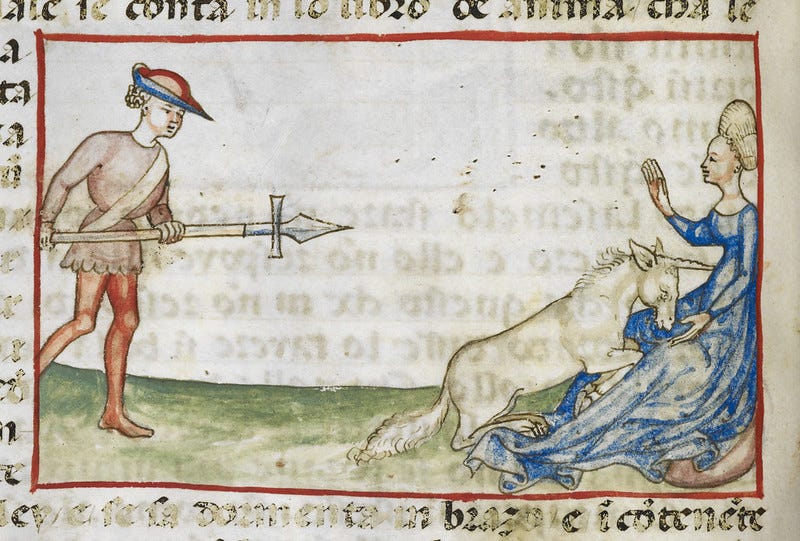
A miniature painting from a sixteenth century manuscript of Nizami's Khamsa ('Five Poems')
Nizami Ganjavi is an important poet in the classical Persian canon. This illustration of the owner of a garden discovering maidens bathing in a pool is from a 1595 Indian manuscript of his Khamsa, which is made up of five narrative poems.
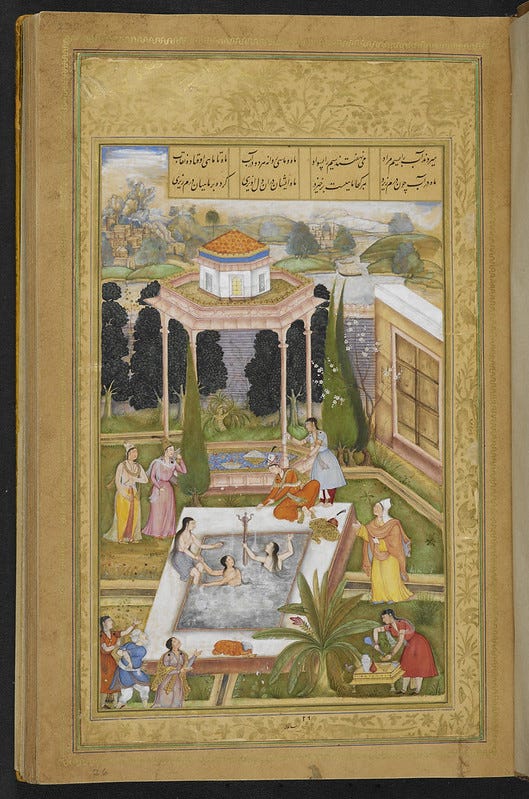
Four Things To Listen To
Four Hit Songs From The Year I Was Born
There are so many good songs to pick from, but for some reason these stuck out to me.
The Duke Of Earl
The Loco-motion
Sealed With a Kiss
Surfin’ Safari
Four Things About Me
One thing I can truly say I learned from my father is not to be afraid to try different kinds of foods. When my brother and I were kids, he would. take us to two different Chinese restaurants in Queens. One of them, King Yum–he was friendly with the owner’s son, if I remember who the guy was correctly–is now out of business. The other, Peking House, is, remarkably, still around. I don’t remember any of the less common dishes he ordered, but I can still hear him encouraging us to “try it” before we decided we didn’t like it. He always promised he would send the dish back if we didn’t like it, but I don’t ever remember that happening. To celebrate my bar-mitzvah, my father took me to a restaurant called the Swiss Pavilion. He ordered escargot–the dish is mentioned in the review at the above link–and when I asked him what it was, he said, “Try it first, then I’ll tell you.” I tried it and I really liked it, though I smile now at the irony of celebrating that particular Jewish rite of passage by eating something as incontrovertibly treif as snails.
I do not like coffee and I have not liked since I was a boy and my grandmother, my mother’s mother, who drank her coffee black—Maxwell House, if I remember correctly—offered me a taste, most of which I spit out. My father, or maybe it was his father—I don’t remember which—did the same thing with beer. They were talking in the kitchen of his parents’ apartment, a beer in front of each of them. I was very young, not more than five or six. I walked in and hopped onto my father’s lap. One of them asked me if I wanted to taste what they were drinking. Of course I said yes and I’m assuming it was my father who let me sip from his bottle. I spit it out. I did eventually learn to like some beers, though, especially during the summer I spent in Scotland in 1985, which is also when I learned to like Scotch, but beer has never been my drink of choice.
Hanging on the wall of my living room are five abstract paintings by mother’s Aunt Gus. There’s also an abstract stone sculpture of hers sitting on the floor in front of our fireplace and, secreted around the house, sculptures of a family that looks like they might be refugees from something. Some of Aunt Gus’ artwork is in a museum down in Georgia, where she lived. My grandmother, her sister, wanted to be a professional singer and, in fact, did sing on the radio at one point. If I remember correctly what I was told, Jimmy Durante, early in his career, was the accompanist. She was also friends with Henry Bellamann, who inscribed copies of two of his books for her, The Upward Pass and Cups of Illusion. They now sit on my shelf.
I just learned that the poet Robinson Jeffers died on the day I was born.
You are receiving this newsletter either because you have expressed interest in my work or because you have signed up for the First Tuesdays mailing list. If you do not wish to receive it, simply click the Unsubscribe button below.
Thanks for reading It All Connects...! Subscribe for free to receive new posts and support my work.
It All Connects is for anyone who grapples with complexity—of identity, art-making, culture, or conscience—to make a difference in their own life and, potentially, in the life of their community.






Member discussion